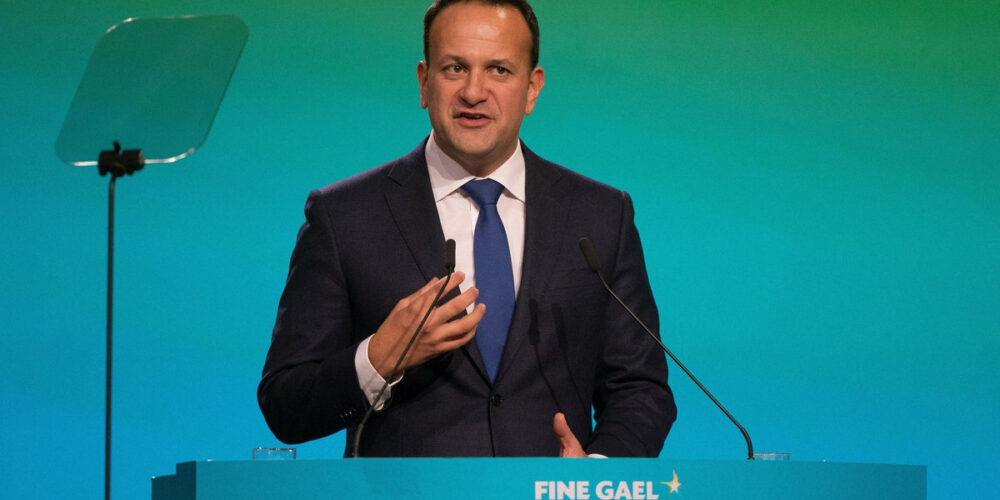Full marks to Leo Varadkar for creativity. When it comes to offering the public something imaginative, he is hard to beat.
He has provided us with many servings. Remember his claim during a period of neo-liberal austerity that welfare recipients were damaging the economy? Then there was his insistence that leaking a confidential document to his pal would improve the health service. Or what about his assertion that the private sector can and will address the housing crisis?
Now we have this intriguing proposal to establish a branch of his party in the Six Counties. So, eighty-five years after a large body of party supporters under the leadership of its first chairperson went to spread their hateful message to the people of Spain, the Blueshirts are coming north. North of Monaghan, that is, the birthplace of their infamous founder.
All right, we may scoff at the incongruity of these patently disingenuous utterances; but beware. Varadkar is not only a right-wing ideologue committed to stringent neoliberalism, as evidenced most recently by his avid support for CETA: he is also a hard-headed realist with a view to the long term. No matter how discordant his utterances appear on the face of it, there is always an underlying and well-thought-out message.
This was the case, for example, when some weeks back, in order to coax the trade union movement into social partnership talks, he disingenuously implied support for increasing wages.
It is in this light that we should consider his address to the Fine Gael ard-fheis when he highlighted the North and his position on the national question. Unlike the Augustinian republicans of Fianna Fáil (God grant us unity, but not just yet), the Blueshirts feel no need to be seen to aspire to end partition. By a strange paradox, this leaves them free to carry out a clinical analysis of the situation in Northern Ireland, and they are now acting in the light of their findings.
After the British general election of 2019 resulted in three nationalist MPs being returned for four Belfast seats, Varadkar spoke accurately of changing political tectonic plates. At that time he argued against pursuing a united-Ireland agenda. However, he has since changed his mind, telling his ard-fheis last month that reunification should be the party’s “mission,” and that this can happen in his lifetime.
It hardly needs a learned political scientist to explain the reasoning behind the latest Fine Gael assessment. The chaotic and very public infighting within the DUP has revealed not just the perilous state of that party but also the terminally damaged condition of Irish unionism in general, details of which we have covered several times in this paper over the past months.
Consequently, the pragmatic Blueshirts are acting accordingly. In contrast to the rudderless Fianna Fáil, the folk in Upper Mount Street have accepted reality and are laying out the groundwork for the type of post-partitioned Ireland they are planning to inflict upon us. Their intentions emerged in Varadkar’s ard-fheis address.
Inspired, perhaps, by the rousing endorsement received by Jeffrey Donaldson, the new leader of the DUP, at the 2019 Fine Gael ard-fheis when he proposed that “Éire” rejoin the Commonwealth, Varadkar suggested that his party establish a branch in the Six Counties, saying: “Not with a view to contesting elections but with a view to recruiting members and building networks with like-minded people, including those in other parties.”
He continued by defining the type of post-partitioned Ireland that he did not want to see. Taking a swipe at Sinn Féin, he insisted that he did not envisage a “cold form of republicanism, socialist, protectionist, anti-British, euro-critical, 50% plus one and nobody else is needed.”
While throwing in a few items supported by no credible political current in Ireland today (nor, in fairness, by Sinn Féin), such as narrow nationalism and “ourselves alone,” he made his intention clear. In his view, the new Ireland must not be republican, socialist, or EU-critical.
Fearful, perhaps, that Fine Gael might steal a march with its lurch towards reunification, Sinn Féin appears to have softened its position in relation to civil liberties. Seemingly determined to avoid causing offence to the state, Mary Lou McDonald has ordered her party not to oppose renewal of the Special Criminal Court.
Confronted with the confusing spectacle of Fine Gael’s support for a united Ireland and Sinn Féin’s about-turn on the draconian Offences Against the State Act, it is important that socialist republicans promote a clear left-wing vision for post-partition Ireland. A useful step would be to convene a series of meetings using “A Democratic Programme for a New Century” (2009)* as the basis for discussion.
*Peadar O’Donnell Socialist Republican Forum, “A Democratic Programme for a New Century” (https://socialistrepublicanforum.files.wordpress.com/2021/02/democratic-programme-for-21st-century.pdf).






